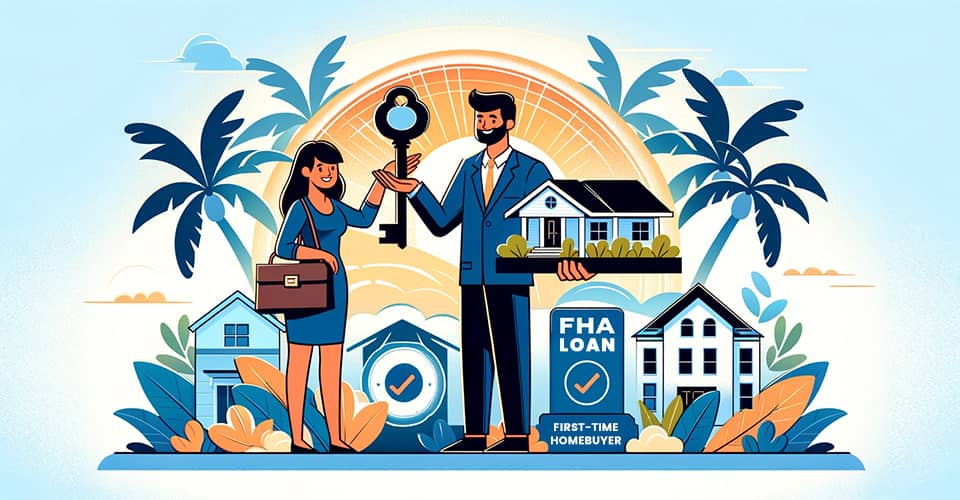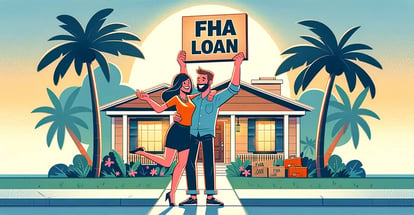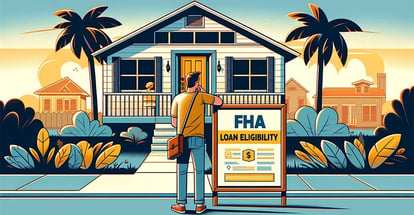FHA Loan Requirements for First-Time Buyers in Florida: Expert Guide
Are you a first-time homebuyer in Florida looking to make your dream of homeownership a reality?
FHA loans require as little as a 3.5% down payment and allow for credit scores as low as 500, making it possible to purchase a $250,000 home with a down payment of only $8,750 compared to the $50,000 needed for a conventional loan with a 20% down payment.
With these benefits, FHA loans have helped hundreds of thousands of Floridians become homeowners.
In this comprehensive guide, we'll explain everything you need to know about FHA loan requirements, limits, and the application process in Florida for 2024.
What Is an FHA Loan and How Does It Help First-Time Homebuyers in Florida?
An FHA loan is a mortgage insured by the Federal Housing Administration designed to make homebuying more accessible, especially for first-time buyers.
Here's how it can benefit you as a Floridian:
-
FHA loans require just a 3.5% down payment, making saving for your first home easier in Florida's competitive housing market.
-
Even if you have a lower credit score or limited credit history, you may still qualify for an FHA loan in Florida.
- FHA loans come with mortgage insurance, which protects lenders and allows them to offer more favorable terms to Florida borrowers.

FHA Loan Requirements for Florida First-Time Buyers in 2024
If you're a first-time homebuyer in Florida considering an FHA loan, it's essential to understand the key requirements. This section will outline the main criteria for qualifying for an FHA loan in Florida in 2024.
-
Minimum down payment of 3.5%
-
A credit score of at least 500 (580 for maximum financing).
-
Debt-to-income ratio below 43%.
-
Proof of steady income and employment.
-
Intended property must be your primary residence in Florida.
- Property must meet FHA safety and livability standards.
FHA Loans in Florida do not have income limits.
Keep in mind that these are the baseline FHA requirements. Some lenders in Florida may have additional criteria, such as higher credit score minimums or reserve fund requirements.
FHA Loan Limits in Florida for 2024
When considering an FHA loan in Florida, it's crucial to understand the loan limits in your county, as they can impact the amount you can borrow. FHA loan limits are updated annually and vary by county, with higher limits in more expensive areas.
For 2024, the FHA loan limit for a single-family home in most Florida counties is $472,030. However, in high-cost counties like Miami-Dade, Broward, and Palm Beach, the limit is $622,590.
Applying for an FHA Loan in Florida: A Step-by-Step Guide
Now that you know the basic requirements and limits, let's walk through the FHA loan application process in Florida. By following these guidelines, you can ensure a smooth and successful journey to homeownership.
-
Check Your Eligibility: Assess your credit score, down payment savings, and debt-to-income ratio to ensure you meet Florida's basic FHA requirements.
-
Get Pre-Approved: Gather your financial documents (tax returns, pay stubs, bank statements) and apply for pre-approval with an FHA-approved lender in Florida like MakeFloridaYourHome. This will give you a clear idea of your budget.
-
Complete the FHA Loan Application: Provide your lender with the purchase agreement and any additional required documentation. They will order an FHA appraisal to assess the property's value and safety.
- Close on Your Florida Home: Once your FHA loan is approved and the appraisal clears, you'll sign the final paperwork and pay your down payment and closing costs. Congratulations, you're officially a Florida homeowner!
Florida FHA Loan FAQ
What credit score do I need for an FHA loan in Florida?
The minimum credit score for an FHA loan in Florida is 500. However, to qualify for the low 3.5% down payment, you'll need a score of at least 580.
How long does FHA loan approval take in Florida?
The FHA loan process in Florida typically takes 30-45 days from application to closing. However, this can vary depending on the complexity of your financial situation and the lender's workload.
Can I get an FHA loan for a condo in Florida?
Yes, you can use an FHA loan to buy a condo in Florida. However, the condo development must be on the FHA's approved list. You can search for FHA-approved condos in Florida here: HUD Condominium Search.
Are FHA Loan Rates Higher Than Conventional Loan Rates?
FHA loan rates are often competitive with conventional ones but can sometimes be slightly higher. However, they are typically lower than rates for borrowers with lower credit scores or smaller down payments on conventional loans.
Are FHA loans available for investment properties in Florida?
No, FHA loans in Florida are only for primary residences. You must plan to live in the home you purchase with an FHA loan.
With over 50 years of mortgage industry experience, we are here to help you achieve the American dream of owning a home. We strive to provide the best education before, during, and after you buy a home. Our advice is based on experience with Phil Ganz and Team closing over One billion dollars and helping countless families.

About Author - Phil Ganz
Phil Ganz has over 20+ years of experience in the residential financing space. With over a billion dollars of funded loans, Phil helps homebuyers configure the perfect mortgage plan. Whether it's your first home, a complex multiple-property purchase, or anything in between, Phil has the experience to help you achieve your goals.


 By
By  Edited by
Edited by 






